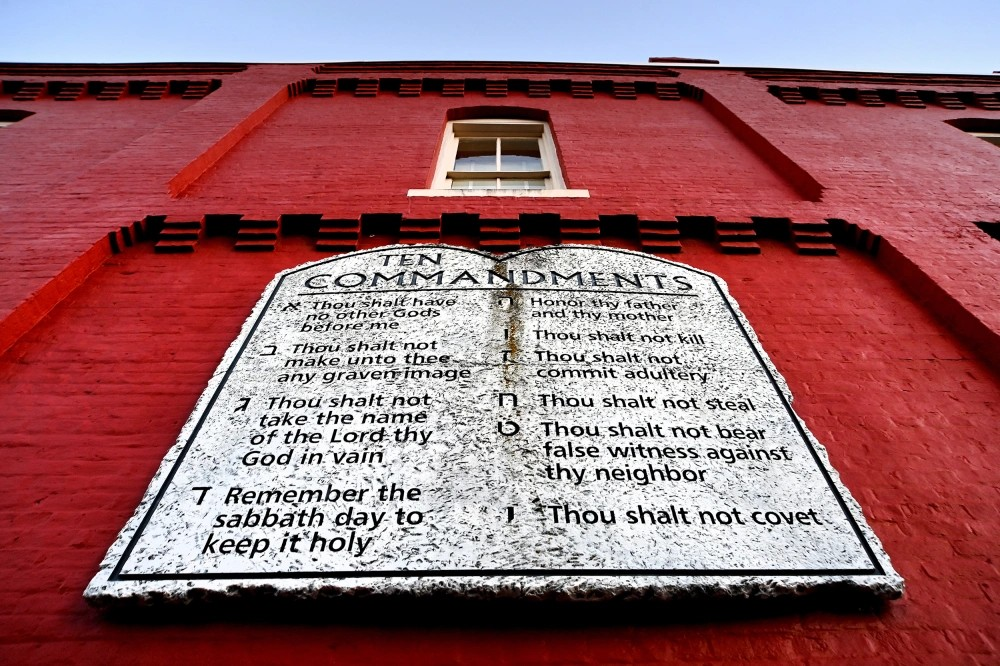Bills introduced by Republicans in the Texas Senate would require the Ten Commandments to be displayed in public schools and allow for schools to carve out time for students to read the Bible, in the latest effort by lawmakers in states to infuse religious doctrine in public education.
“The Ten Commandments are part of our Texas and American story,” Sen. Phil King, the lead author of the bill, said in a statement Monday, adding that “if our students don’t know the Ten Commandments, they will never understand the foundation for much of American history and law.”
Meanwhile, another bill was filed that would permit school districts to adopt policies allowing for a period of prayer and reading of scripture or “other religious text” with parental consent.
“Our schools are not God-free zones,” the bill’s author, Sen. Mayes Middleton, said in a statement, while also thanking President Donald Trump and Texas Lt. Gov. Dan Patrick for “making prayer in public schools a top priority.”
A previous push to get a Ten Commandments bill passed in the Texas Legislature failed in 2023 because of time constraints, but Patrick has said that among his primary concerns for the current session, which began last month, will be ensuring the legislation’s success. He also applauded Louisiana, which last year became the first state to require the Ten Commandments to be displayed in all public school and college classrooms.
While Louisiana’s law went into effect Jan. 1, its implementation remains in limbo after a coalition of parents sued in federal court, arguing that the requirement interferes with their First Amendment right to raise their children with whatever religious doctrine they choose. A federal appeals court is expected to rule on the matter after a lower court judge concluded in November that Louisiana had not offered “any constitutional way to display the Ten Commandments.”
King said he believes his bill stands up to scrutiny following a 2022 Supreme Court ruling that found a former Washington state high school football coach had a right to pray on the field immediately after games. The ruling by the conservative-majority court took a different approach by examining “historical practices and understandings” to interpret whether the First Amendment was being violated.
“The legislation is in accord with the history and traditions of our state and nation,” King said, adding that students will “appreciate the role of the Ten Commandments in our heritage.”
The Supreme Court previously took up the issue of the Ten Commandments in public schools in 1980, when it struck down a Kentucky law as unconstitutional.
Louisiana’s law and the introduction of similar bills throughout the country could propel the issue before the high court yet again.
A Kentucky bill introduced last month would allow public schools to post the Ten Commandments but would not make it a requirement. An Ohio bill would require schools to select from a list of nine historical documents to display in classrooms, the Ten Commandments among the options. And in Georgia, a bill filed last week would force public elementary and secondary schools to place copies of the Ten Commandments in certain locations, such as the main entrance of a building.
Similar Ten Commandments bills in Montana and North Dakota have been debated in recent weeks, while a bill in South Dakota failed Monday in the House in a 37-31 vote.
Some Republican lawmakers were among those who voted against South Dakota’s bill that would have compelled public schools to display the Ten Commandments, with those GOP legislators arguing that the bill could have been stronger and others uneasy with the government creating such a mandate.
The American Civil Liberties Union, which is supporting the parents’ lawsuit against Louisiana’s Ten Commandments law, said the bill’s rejection in South Dakota should serve as a “reality check” for bringing religious text into public education.
“Public schools are not Sunday schools, and today’s vote ensures that our public school classrooms will remain spaces where all students, regardless of their faith, feel welcomed,” Samantha Chapman, ACLU of South Dakota advocacy manager, said in a statement.
Texas’ Ten Commandments bill could face an easier road ahead in the Republican-controlled Legislature because it was introduced earlier in the session and is a higher priority among Republican leaders, after a deadline was missed for it to advance in 2023. Gov. Greg Abbott, a Republican, posted on X last month in reference to a reintroduced bill: “Let’s do it.”
Still, Republicans can expect opposition from Democrats who have said the state should focus on the full funding of public schools rather than wedge issues.
“This is a divisive bill that distracts from real solutions for Texans,” Sen. Sarah Eckhardt said. “Segregation along religious lines is still segregation, and that is the reason for separating church and state.”
Original Article – Texas bills would allow Ten Commandments and Bible reading in public schools







